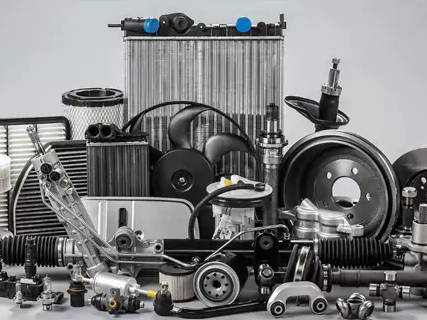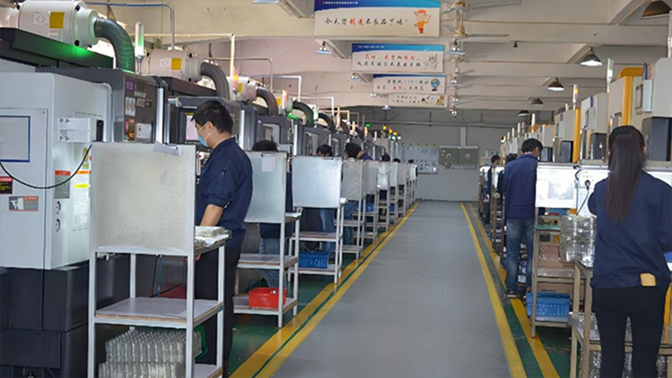Blog
We regularly update articles related to the prototyping and manufacturing industry. You’re welcome to check our previous blogs and subscribe to our newsletter.
How Can Four Axis Machining Improve Efficiency and Productivity?
Louis Machine, a leading four axis machining service supplier, plays a vital role in supporting various industries with precise and efficient manufacturing processes. By leveraging cutting-edge four axis machining technology, Louis Machine provides solutions that cater to the unique demands of automotive, electronic consumer products, and precision hardware parts industries. Let’s explore how four-axis machining is transforming these industries.
Four Axis Machining in the Automotive Industry
1.1 Meeting Industry Needs with Precision
The automotive industry has experienced tremendous growth, driven by the demand for high-quality and complex accessory parts. This sector requires precision, cost-efficiency, and quick turnaround times to meet market demands. Four-axis machining offers an ideal solution, enabling manufacturers to produce intricate components with high accuracy and efficiency.
1.2 Innovations and New Technologies
Louis Machine leverages the latest four-axis machining innovations, such as automation and smart manufacturing, to produce automotive parts with unparalleled precision. The advanced machinery supports the production of complex components, including engine parts, transmission components, and chassis elements, ensuring consistency and quality.
1.3 Industry Trends
The automotive industry is embracing automation and smart manufacturing techniques to enhance efficiency and productivity. Four-axis machining plays a crucial role in this transformation, offering versatile solutions that adapt to evolving industry trends and technologies.
Four Axis Machining in Electronic Consumer Products
2.1 Precision for Fast-Paced Growth
The electronic consumer products industry is known for its fast-paced growth and focus on miniaturization. Four-axis machining is a key player in this field, providing manufacturers with the ability to create highly detailed and precise components essential for modern electronic devices.
2.2 Tackling Complex Design Requirements
Four-axis machining enables the production of complex and intricate designs, essential for electronic consumer products. This technology supports the manufacturing of components for smartphones, tablets, and other devices, meeting the industry’s demand for miniaturization and precision.
2.3 Examples of Success
Louis Machine’s expertise in four-axis machining has contributed to the production of successful electronic consumer products. For instance, their services have been instrumental in manufacturing high-precision connectors, intricate casings, and other essential parts for leading tech companies.
2.4 Emerging Trends
As the electronic consumer products industry continues to evolve, emerging trends such as smart devices and tech integration are shaping the future of four-axis machining. Louis Machine stays ahead of these trends, providing manufacturers with state-of-the-art machining solutions that cater to the latest demands.
Four Axis Machining in Precision Hardware Parts
3.1 High Demand for Precision
The demand for precision hardware parts is growing across various sectors, including aerospace, medical, and other industries. These sectors require tight tolerances, specialized materials, and exacting standards, making four-axis machining a perfect fit.

3.2 Meeting Industry Challenges
Louis Machine addresses the needs and challenges of precision hardware manufacturing with four-axis machining. By offering accuracy and repeatability, the company ensures the production of reliable and consistent parts for a variety of industries.
3.3 Innovations in Machining
Louis Machine stays at the forefront of advancements in materials and techniques, providing innovative four-axis machining solutions for precision hardware parts. This includes the use of advanced materials such as titanium, stainless steel, and aluminum alloys to create durable and high-performance components.
3.4 Industry Trends
The precision hardware industry is seeing advancements in materials and techniques, with a focus on improving the quality and performance of parts. Louis Machine’s four-axis machining services align with these trends, offering manufacturers the precision and flexibility they need to stay competitive.
Enhancing Manufacturing Efficiency with Four-Axis Machining
4.1 Introduction
Four-axis machining offers manufacturers the ability to improve manufacturing efficiency across various industries. Louis Machine, a leading four-axis machining service supplier, helps companies increase productivity while maintaining high-quality standards. This blog explores the challenges of achieving speed and precision and the solutions four-axis machining provides to balance these needs.
4.2 Industry Needs
As industries strive to boost productivity and reduce lead times, maintaining quality remains a top priority. Manufacturers are continually seeking ways to optimize production processes and achieve consistent, high-quality outcomes.
4.3 Challenges
The challenge lies in combining speed and precision without compromising quality. Traditional methods may struggle to achieve these goals, leading to potential inefficiencies and defects. Therefore, finding the right balance is essential for meeting industry demands.
4.4 Solutions
Four-axis machining strikes a balance between speed and precision by allowing simultaneous movement on four axes. This technology improves productivity and quality by enabling complex cuts, intricate designs, and seamless operations in a single setup. The result is a streamlined process that saves time and ensures consistent, high-quality parts.
4.5 Examples of Successful Applications
Louis Machine’s four-axis machining services have been successfully applied across industries, delivering exceptional results. For example, in the automotive sector, Louis Machine produces precision components with tight tolerances and smooth finishes. In the electronics industry, the company creates intricate and detailed parts for consumer devices. These successful applications showcase the benefits of four-axis machining in enhancing manufacturing efficiency.
4.6 Future Trends
The future of four-axis machining lies in incorporating AI and automation. By leveraging these technologies, manufacturers can further optimize processes, improve quality, and increase productivity. Louis Machine is at the forefront of these trends, offering advanced solutions that integrate machine learning and IoT for seamless manufacturing.
Trends and Innovations in Four-Axis Machining
5.1 Introduction
Four-axis machining is evolving rapidly, with widespread adoption across various sectors. As technology advances, emerging trends such as automation, machine learning, and IoT integration are reshaping the manufacturing landscape. Louis Machine remains a key player in providing innovative four-axis machining services.
5.2 Current Industry Status
Four-axis machining is now a common manufacturing process in industries such as automotive, electronics, and precision hardware. Its flexibility and precision make it an essential tool for modern manufacturing.
5.3 Emerging Trends
Automation is transforming four-axis machining, allowing for faster, more consistent production. Machine learning and IoT integration enable smart manufacturing practices, leading to greater efficiency and predictive maintenance. These trends help companies stay ahead in a competitive market.
5.4 New Technologies
Louis Machine utilizes advanced materials, software, and robotics in four-axis machining. These innovations enhance productivity and enable the creation of high-quality, complex parts with ease. By embracing new technologies, manufacturers can achieve superior results.
5.5 Impact of Trends on Industries
The impact of these trends is evident across industries. In the automotive sector, precision and efficiency improve production processes. In electronics, intricate designs and components are made possible. Precision hardware benefits from the accuracy and repeatability of four-axis machining.

5.6 Future Outlook
The future of four-axis machining involves further integration of AI, automation, and IoT. These advancements will continue to shape industry practices and drive progress in manufacturing.
Conclusion
Louis Machine’s four-axis machining services are transforming the automotive, electronic consumer products, and precision hardware parts industries. By providing innovative solutions that cater to the specific needs of each industry, Louis Machine ensures high-quality manufacturing processes that drive growth and success. As technology continues to evolve, four-axis machining will remain an essential component in the future of manufacturing.





